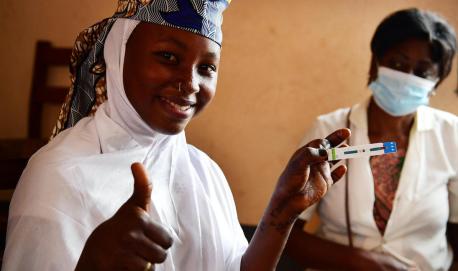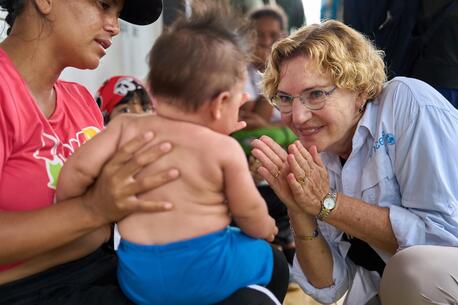
HIV/AIDS
With global, government and grassroots partners, UNICEF is working toward an AIDS-free world — improving protections for children and families against HIV infection and making treatment services more accessible. Learn more.
Making progress in the fight against HIV/AIDS
Over the last quarter century, great gains have been made in the fight against AIDS, with many key milestones achieved. From 2010-2020, new HIV infections among children dropped by more than half.
UNICEF has reached — and continues to reach — millions of children, adolescents and pregnant women with essential HIV services, including uninterrupted access to lifesaving treatment. And yet hundreds of thousands of children and adolescents continue to be infected with this virus every year.
Every day, hundreds of children die from AIDS-related causes, mainly because of inadequate access to HIV prevention, care and treatment services. And the COVID-19 pandemic only exacerbated inequities in access to HIV testing and treatment, putting more lives at risk.
Today, too many children and adolescents are infected with HIV and too many are not receiving antiretroviral therapy.
Making sure that the millions of children and adolescents currently living with HIV can get the services they need
UNICEF is committed to achieving an AIDS-free world — one where all children and their families are protected from HIV.
To that end, UNICEF is supporting a range of innovative solutions aimed at strengthening community-level health services and support and improving the availability of medicines and HIV self-testing, among many other measures.
'Building back better' — UNICEF's overarching mission strategy — requires HIV responses that are evidence based, people centered, resilient, sustainable and, above all, equitable.
UNICEF is calling on governments to help deliver these initiatives through a reinforced primary health care movement — one that involves meaningful engagement of all affected communities, but particularly the most vulnerable and marginalized ones.
Top photo: Maryam, 15, of Bertoua, Cameroon, tests negative for HIV. © UNICEF/UN0422722/Dejongh



